Perplexity AI - The Conversational AI
Perplexity AI summarizes key information and presents it to the user with citations. Unlike a traditional search engine, it does not present links for self-reading to get key information.
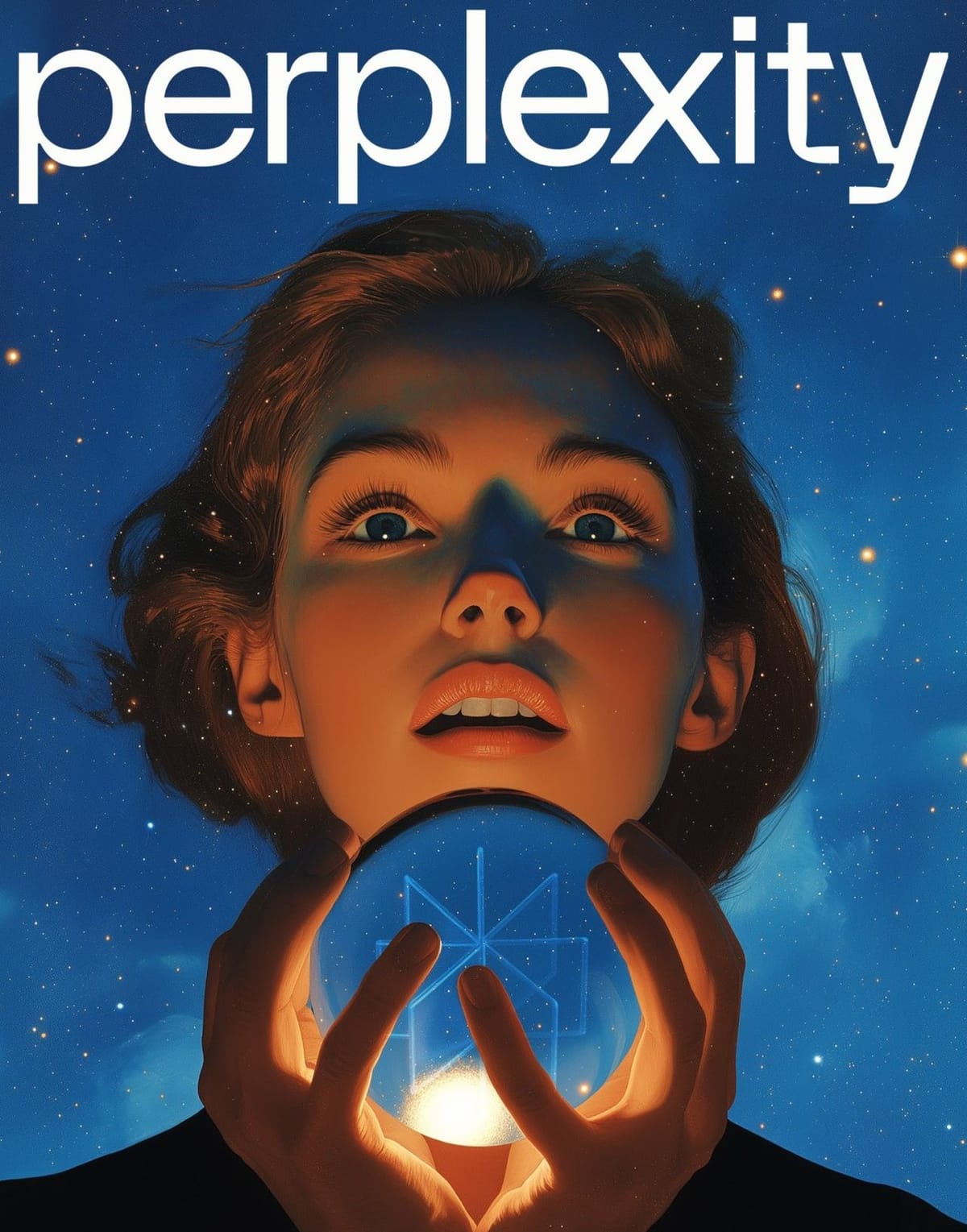
Perplexity AI, an advanced search engine founded in 2022 is designed to understand and respond to queries with high accuracy and contextual understanding. It answers queries using natural language processing (NLP) predictive text, using sources from across the web. Unlike traditional search engines that rely heavily on keyword matching, Perplexity AI utilizes NLP and machine learning algorithms to interpret the intent behind a user's query. This allows it to deliver relevant and insightful results, addressing the user's specific needs. In the context of AI, perplexity refers to using AI and NLP to predict words in sequence providing better understanding and predictions.
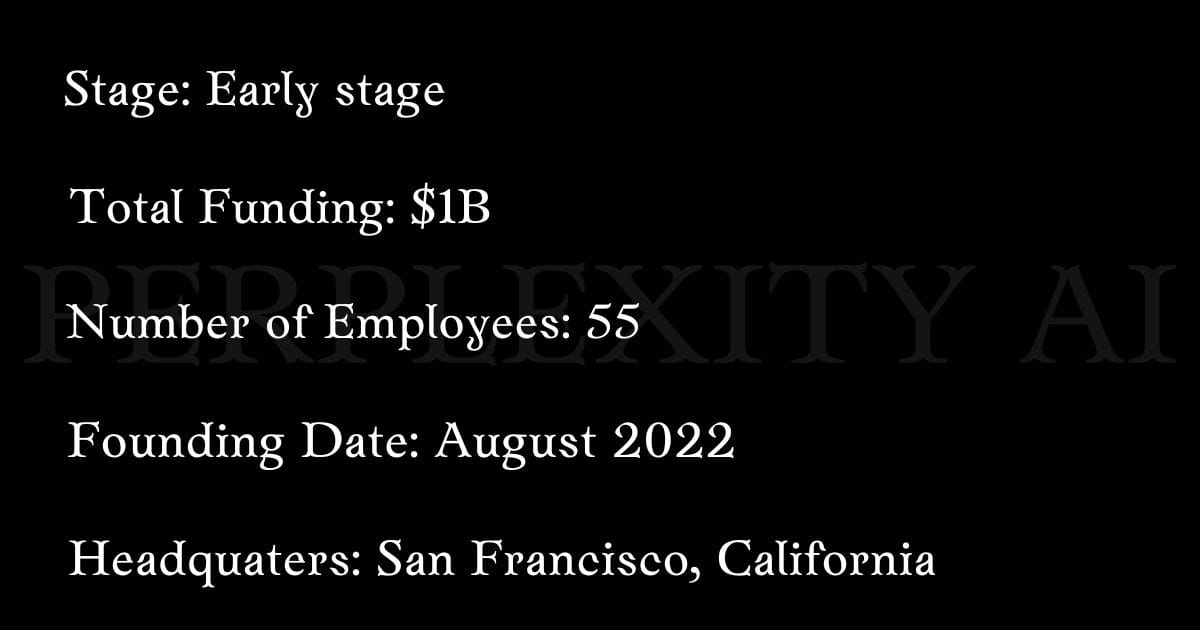
Thesis
The first search engines Archie, Veronica, and Jughead were introduced in the early 1990s. They were primarily focused on indexing FTP archives, allowing users to search for files stored on various servers. With the expansion of WWW, more advanced search engines emerged, including Yahoo! and AltaVista, which indexed entire web pages and provided keyword-based search capabilities. In 1998, Google was introduced which made a turning point in search engine developments. Unlike the older search tools, Google used the PageRank algorithm which ranked web pages on the relevance of the page and the number of backlinks.
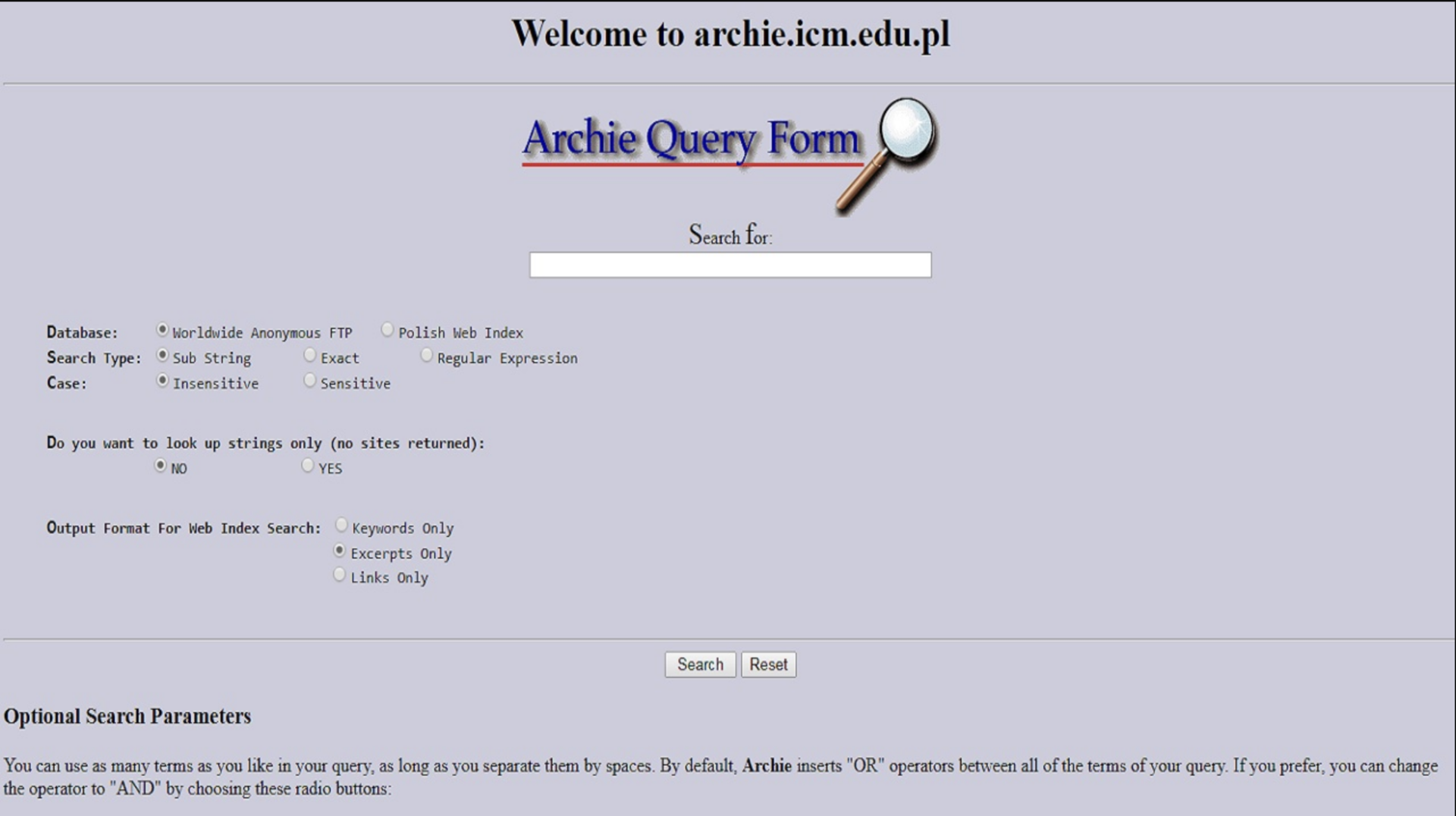
Challenges of Traditional Search Tools
Traditional search engines primarily relied heavily on keyword matching and link analysis to generate search results. While this approach worked well for simple queries, it struggled with more complex or ambiguous queries that required a deeper understanding of context and user intent. Some of the key challenges included:
- Ambiguity: When ambiguous queries are used on a traditional search engine, it often results in providing irrelevant results.
- Contextual Understanding: Traditional search engines had limited ability to understand the context of a query, leading to results that were not aligned with the user's intent.
- Information Overload: The high volume of data available on the internet makes it difficult for users to find relevant information without reading through pages.
- Lack of Conversational Search: Traditional search engines were not designed to handle conversational queries, which users who want a conversational approach may not prefer.
- Ads: Google, a traditional search engine, makes its revenue from ads. This inconveniences users who wish to use the search engine without ads.
The Emergence of Perplexity AI
Perplexity AI was founded in 2022 to address the limitations of traditional search engines. It was designed to provide a more intuitive and accurate search experience using advanced AI and NLP technologies. Perplexity AI's approach to search differs from traditional search as it focuses on understanding the user's intention and providing the user with contextual results. The perplexity AI works in such a way that when the user inputs a query into the AI, it searches web pages to generate relevant answers and puts out a well-structured answer with citations. Unlike Google, where users have to go through links to read through webpages to find an answer, Perplexity does that all in one. It provides links to other information related to the user queries in case the user wants to search deeper.
Perplexity AI utilizes several cutting-edge technologies to achieve its goals: The key features include:
- Natural Language Processing (NLP): The core engine of Perplexity is NLP. NLP enables search engines to understand, process and converse in natural language thereby enhancing user interaction. It uses sophisticated NLP models, including GPT-4, to understand user queries contextually, allowing for conversational interactions rather than keyword-based searches. An example is when a user who wants to learn about Perplexity AI uses queries like “Could you tell me more about Perplexity AI including the core features” rather than “What is Perplexity AI” and starts going through links to learn about Perplexity AI.
- Machine Learning Algorithms: Perplexity AI employs machine learning algorithms to analyze user queries, identify patterns, and deliver personalized search results. This algorithm improves by learning user interactions and the relevance of search results over time.
- Contextual Understanding: Perplexity AI has demonstrated a contextual understanding of keywords by analyzing the relationship of words in a query. It maintains context when analyzing user queries thereby providing comprehensive search results.
- RAG: Perplexity AI summarizes key information and presents it to the user with citations. Unlike a traditional search engine, it does not present links for self-reading to get key information, however, it summarizes key information by searching through the web pages and extracting key information from the pages. This is made possible by retrieval-augmented generation (RAG). This feature enables LLMs to generate contextual information based on information available across the web rather than being confined to a set of data used in training. This technology has been used to improve LLMs to reduce hallucination.
- Multi-Modal Capabilities: The multi-modal AI models use different types of prompts to generate responses. Older generative AI versions required using texts for generative AI. With advancements in AI technology, Perplexity AI can be promoted with any type of data format and generate responses in any format according to user preference.
Founding Story
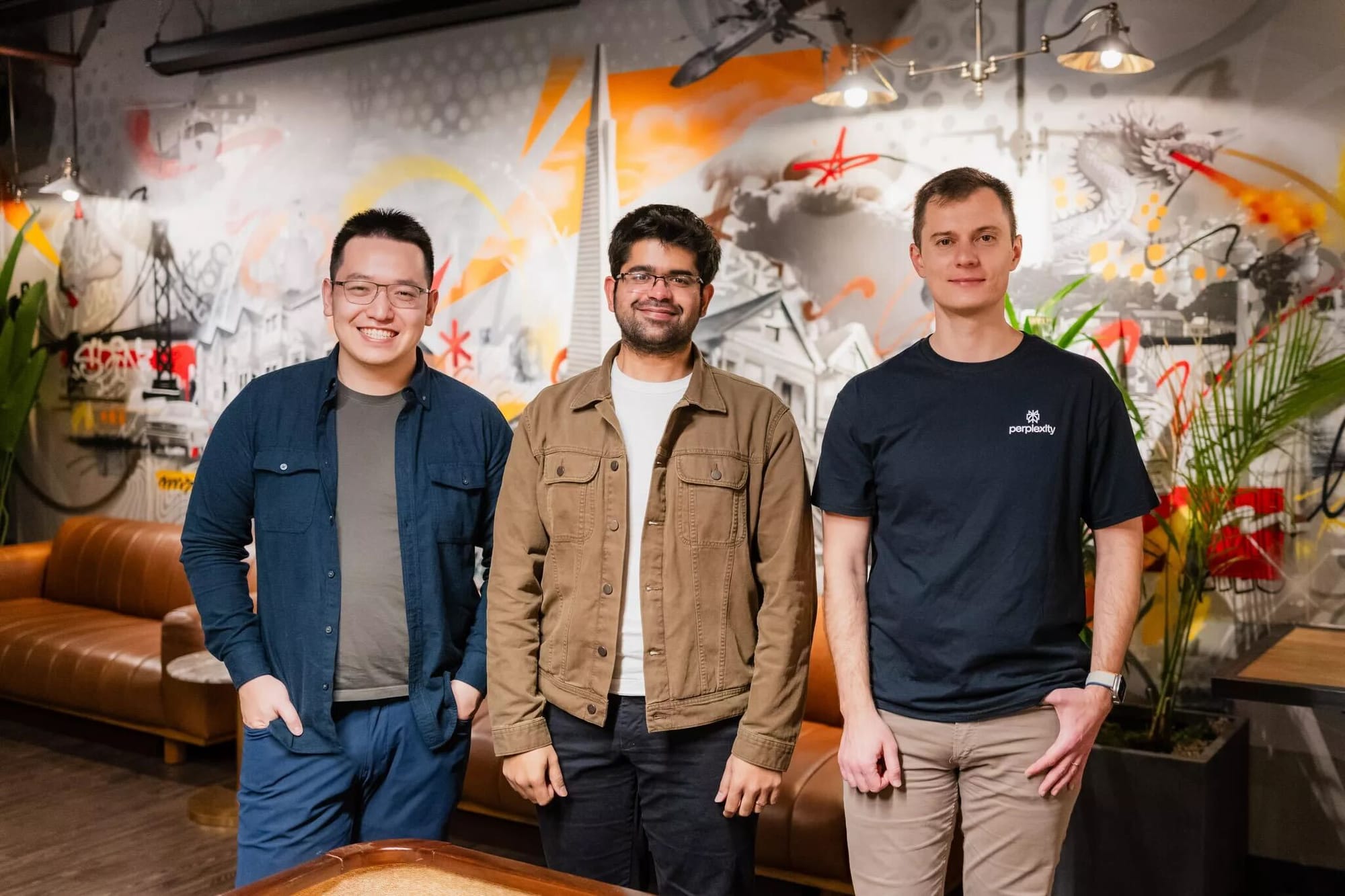
Founders and Their Vision
Aravind and other co-founders Dennis and Johnny wanted to build products with LLMs. He wanted a company that is based on complete AI. A startup that will be built on data collection and improves with time.
In an interview with EO, Aravind Srinivas, the co-founder and CEO of Perplexity AI, narrated their journey in building the AI tool. He stated they want to revolutionize how people consume information online. Aravind grew up in India, studied in the IIT was into programming, and worked at OpenAI in 2008 summer as a research intern. Narrating his inspiration,
“I worked at OpenAI as a research intern. I thought it was good. Okay, I did well in India. I came to Berkeley, I’m like definitely one of the top AI PhD students and went to OpenaI, and I felt like really bad because people were so much better than me. It was a big reality check, that okay I could improve a lot more in programming. After my internship at OpenAI in 2018, the same year GPT 1 was released. We realized that there is this new form of learning using all the internet data and learning from it and I figured that was going to be more important so I told my advisor that this was the right thing to do, we should work on this, and he was open-minded and said okay you know what? Like I'm not a specialist here but let's try. I mean if this the next thing the best way to learn a new topic is to force yourself to teach it to others”
They went ahead to learn coding for two years and he stated that it helped him find a new topic on how to combine generative AI and RL.
Perplexity, A Conversational AI
“Perplexity is the first world conversational search engine. Earlier, we were used to entering something like keywords or a bunch of phrases and Google gives you ten blue links, and you open each of them and you start reading. Perplexity is trying to build a future where you don't have to do this. You can just come and ask a question like how you would ask a friend and that AI replies with the answer but not just the answer, every sentence that it says has a corresponding reference we call it a citation.”
Perplexity AI was built to help people find what they are looking for even when they don't have the exact query.
On the first launch, they served 2000 to 3000 queries while now they serve about 2 to 10 million queries daily. The goal was to serve what ChatGPT and Google Bard can't do. They keep improving their product with user data.
The Pro Plan is $20 monthly. He why they priced it the same as ChatGPT.
“We use OpenAI’s GPT-4. If we priced it lower than ChatGPT people would come to pay for it but bit necessarily for what we are. Probably because we subsidized GPT-4 and gave it to the user. Subsidy in any industry has product market fit but then do you have product market fit a company because you subsidizing something everybody wants which is GPT-4, or do you have product market fit for your core offering which is combining LLM and search engine?
Focusing on a customer-centric approach with 30 workers, Perplexity AI came to life in 2022.
Funding and Valuation
September 2022, angel investors participated in Perplexity's $3.1 million seed round led by Elad Gil a Nat Friedman, with participation from Pieter Abbeel, Yann LeCun, Andrej Karpathy, Ashish Vaswani, Amjad Masad, Clem Delangue and others.
On March 8, 2023, Perplexity AI announced raising $25.6 million in series A at a valuation of $150 million. The funding round was led by Peter Sonsini of New Enterprise Associates with participation from their seed round investors Elad Gil, Nat Friedman and Bob Muglia, as well as their new investors Susan Wojcicki, Paul Buchheit, Soleio, and Databricks Ventures.
January 4, 2024, Perplexity Ai announced raising $73.6 million in Series B at a valuation of $520 million. The funding round was led by IVP with continued support from their Seed and Series A investors NEA, Elad Gil, Nat Friedman, and Databricks, as well as new investors NVIDIA, Jeff Bezos (through Bezos Expeditions Fund), Tobi Lutke, Bessemer Venture Partners, Naval Ravikant, Balaji Srinivasan, Guillermo Rauch, Austen Allred, Factorial Funds, and Kindred Ventures, among others.
On April 24, 2024, Aravind announced in a Tweet about the company raising $62.7 million at $1.04 billion valuation, led by Daniel Gross, along with Stan Druckenmiller, NVIDIA, Jeff Bezos, Tobi Lutke, Garry Tan, Andrej Karpathy, Dylan Field, Elad Gil, Nat Friedman, IVP, NEA, Jakob Uszkoreit, Naval Ravikant, Brad Gerstner, and Lip-Bu Tan.
Product
Perplexity product is a conversational search engine powered by AI. Perplexity AI is reported to have 10 million monthly users, 2 million search queries and 600 searches from pro accounts daily. Perplexity AI costs $20 for a pro account which has higher search numbers.
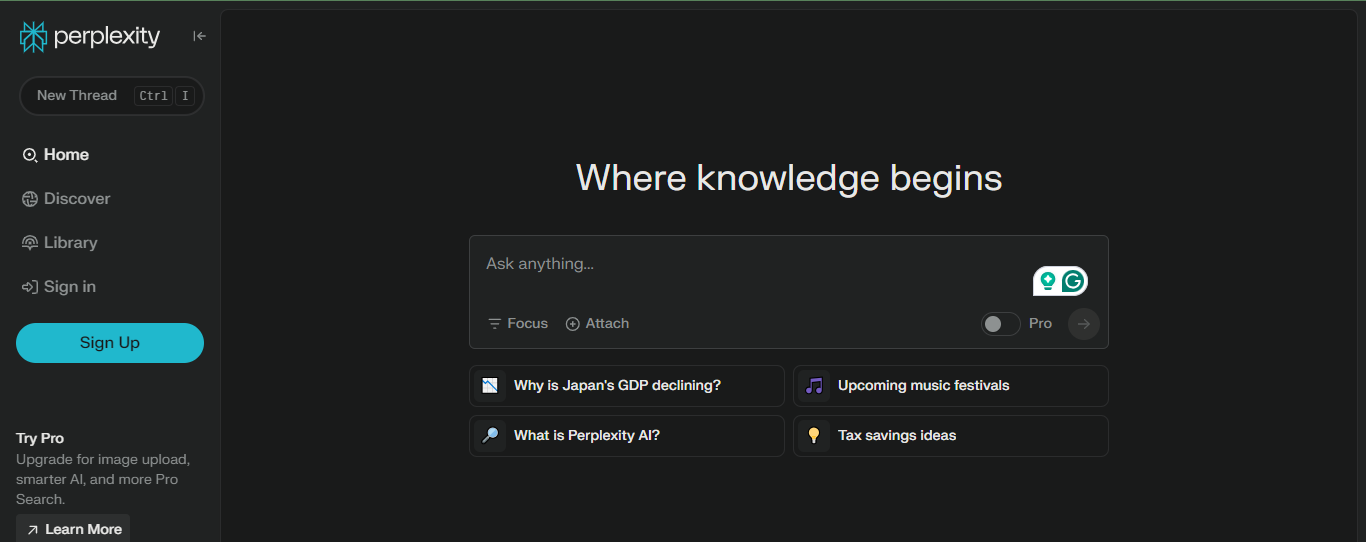
Perplexity AI partnered with Polymarket which gives Polymarket access to Perplexity API to display news summaries on the Polymarket website according to Techcrunch. Users can click on an event, and they will see the summary news of the event based on search results from Perplexity. You can also use the search box to ask more questions. Polymarket is using Perplexity API as a product to summarize news for the users based on real-time search results.
Market
Target Audience
Perplexity AI, an innovative search tool, targets a diverse range of markets with its advanced AI-driven capabilities. Here's a breakdown of its key target markets:
1. General Consumers
Perplexity AI is designed for everyday users especially those who seek more accurate and relevant search results without clicking on links and reading through web pages.
2. Students and Academics
The education sector, including students, researchers, and academics, is a significant target market for Perplexity AI. Its ability to generate results and cite the authors makes it a good fit for students and academia who want specific direct information from researchers without looking for their exact published works on the web.
- Content Creators
Content creators, journalists, and media professionals can benefit from Perplexity AI's dynamic response generation and ability to surface relevant information quickly and in real-time.
Market Size
Perplexity AI operates in the rapidly growing market of AI-powered search tools, a segment within the broader search engine and AI industries. Estimating the market size for Perplexity AI involves looking at several factors:
- AI Market: As of 2024, the global artificial intelligence (AI) market is valued at approximately USD 638.23 billion, but this is just the beginning. According to Precedence Research, the market is projected to soar to around USD 3,680.47 billion by 2034, boasting a compound annual growth rate (CAGR) of 19.1% over the next decade.
- Enterprise Search Market: Perplexity AI also taps into the enterprise search market, which was valued at approximately $5.8 billion in 2020 and is expected to grow to $11.3 billion by 2026 at a CAGR of 11.7%. This market includes businesses that require advanced search capabilities for internal data management and information retrieval.
Competition
There are growing similar products in the AI industry. These may become big rivals to Perplexity AI including:
- ChatGPT (OpenAI):
ChatGPT can perform search functions with browser tools that allow real-time search and citation of sources. Both ChatGPT Plus and Perplexity use GPT-4 as their core technology.
- Google Bard:
Bard recently called Gemini uses LLM to provide conversational search experiences similar to Perplexity AI. It has access to search engine technologies and provides source links for further research.
- Bing AI (Microsoft) with GPT-4:
Integrated into Microsoft’s search engine Bing, the Copilot, an AI-driven search tool which also uses GPT-4, provides conversational search experiences making it a competitor with Perplexity.
- You.com:
Powered by GPT-4, You.com focuses on privacy and gives users the option to customize the tool. It competes with Perplexity AI in providing a more personalized experience.
These tools represent a range of approaches to integrating AI with search functionality, each with its strengths depending on user needs and preferences.
Business Model
The Perplexity AI business model is focused on an advanced AI-powered engine that provides users with answers that are sourced from across webpages using LLMs. It is a for-profit company that provides users with free and pro versions with their pro versions priced at $20 monthly.
The free model gives users access to unlimited quick searches and limited pro searches.
The Pro version gives access to over 300 pro searches per day, access to other AI generative models, and other benefits.
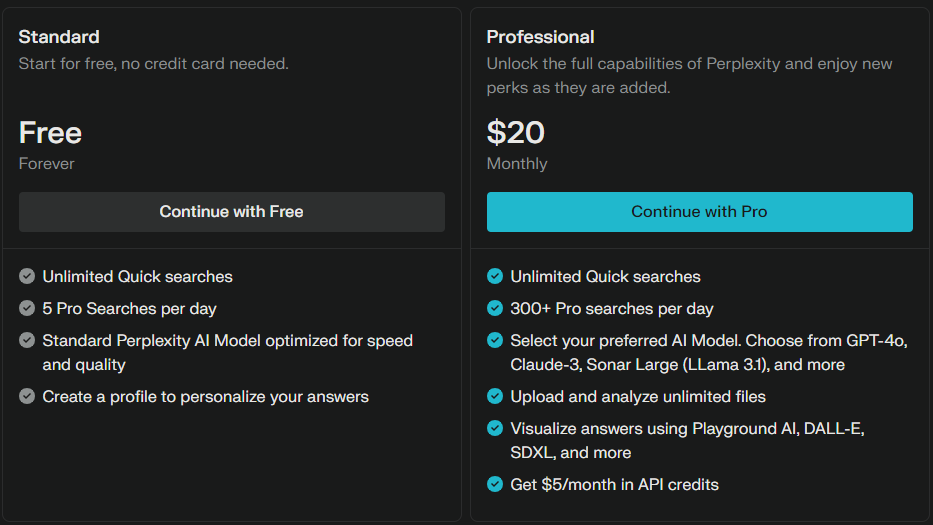
Conclusion
Perplexity AI is the first-of-its-kind search tool that leverages the power of artificial intelligence to provide more accurate, relevant, and contextually aware search results. It represents an advancement in traditional search tools and chatbots. Using AI technology like GPT-4, Claude, Mistral, and advanced AI features like the Multi-Modal and RAG, and dependency on data to improve, Perplexity AI continues to evolve.



